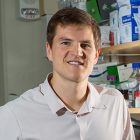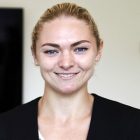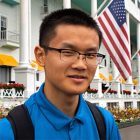Amelia Gagnon is a PhD candidate whose research draws on multiple disciplines to develop cutting-edge instrumentation to monitor human health and performance for pilots, astronauts, and others who operate in high-performance environments. With the support of her third MathWorks Fellowship, Amelia will pursue two projects, both of which rely on MathWorks tools. The first project explores the use of functional near-infrared spectroscopy (fNIRS) as an additional sensory modality to support the objective measurement of cognitive load in operational environments. The second project focuses on hurricane and tropical storm monitoring using microwave radiometers onboard CubeSats; data from this project will help to advance weather monitoring with greater temporal resolution. Amelia’s innovative and interdisciplinary work has yielded valuable contributions for both satellite systems and human space exploration and has the potential to offer many more useful insights and tools for air, space vehicles, and Earth-based applications.
https://engineering.mit.edu/wp-content/uploads/2023/10/Gagnon_Amelia_mathworks2023_headshot.jpg
Website
Amelia Gagnon
Aeronautics and Astronautics https://engineering.mit.edu/fellows/amelia-gagnon-2/Chinmay Gangal is a PhD candidate whose research examines flow-induced crystallization (FIC) in polymers using computational methods. Specifically, he is developing computational methodologies to study the first stage of FIC, the flow-enhanced nucleation (FEN) of crystals in polymers, a process with relevance to a number of important industrial processes such as the fabrication of fibers, films, packaging, and composites. A MathWorks Fellowship will support Chinmay’s ongoing research to understand FEN through molecular simulations that examine four key FEN parameters: different flow types, temperatures, strain rates, and polydispersity. He is also developing a new methodology for cases where the activation barrier for crystal nucleation is too high to surmount by brute force molecular dynamics simulations, using an advanced technique called forward flux sampling. In the future, he plans to apply machine learning techniques to the identification of crystalline clusters within his simulations. Chinmay’s work is bringing new capacity in molecular-level modeling to the MathWorks community and has the potential to provide important new insights and strategies in polymer modeling, with significant benefits for research and industry.
https://engineering.mit.edu/wp-content/uploads/2023/10/Gangal_Chinmay_mathworks2023_headshot.jpg
Website
Chinmay Gangal
Chemical Engineering https://engineering.mit.edu/fellows/chinmay-gangal/Chloe Gentgen is a PhD candidate whose research focuses on developing critical capabilities to support space exploration, including mission architecture, propulsion systems, and in-situ resource utilization. Her notable achievements include a successful demonstration of in-space refueling through a microgravity experiment; leading MIT’s winning team in the RASC-AL 2022 challenge to design an architecture for propellant production on Mars; and working on a NASA mission proposal to explore Enceladus, a moon of Saturn. Supported by her second MathWorks Fellowship, Chloe will develop a MATLAB-based design methodology framework for planetary exploration, using the future Uranus mission as a case study. Her goal is to offer design modifications to enhance the mission concept currently selected by the National Academies, including identifying new technologies that can increase the spacecraft’s performance and understanding the feasible sequences of fly-bys that will allow the spacecraft to meet its scientific goals at Uranus. Chloe’s path-breaking work has already yielded important contributions to space systems engineering, and her work holds significant potential to advance future explorations of our solar system.
https://engineering.mit.edu/wp-content/uploads/2023/10/Gentgen_Chloe_mathworks2023_headshot.jpg
Website
Chloe Gentgen
Aeronautics and Astronautics https://engineering.mit.edu/fellows/chloe-gentgen-2/Samuel Dutra Gollob is a PhD student whose research interests focus on the design, modeling, and fabrication of soft robotics. To advance this work, Sam has built a generalized modeling tool for soft actuator design and multi-modal models for use in controls and the design of other soft robotic architectures. With the support of a MathWorks Fellowship, he will extend these approaches to create a modular multi-physics modeling tool to design novel soft robotic pneumatic power sources that address the limitations of pneumatic actuation approaches by leveraging reactions with propellants to power lightweight, fast, and controllable pneumatic devices. Sam’s ultimate goals are to build a design framework for propellant-based pneumatic power that integrates existing and novel architectures and to develop a fully coupled model to design propellant power sources.
MathWorks tools are central to Sam’s research. His contributions to fundamental research and practical tools could have a significant impact on future soft robotics devices, from implantable and wearable medical devices to technologies for deep-sea sample collection and search-and-rescue operations.
https://engineering.mit.edu/wp-content/uploads/2023/10/Gollob_Samuel-Dutra_mathworks2023_headshot.jpg
Website
Samuel Dutra Gollob
Mechanical Engineering https://engineering.mit.edu/fellows/samuel-dutra-gollob/Minghao Guo is a PhD candidate whose research interests are in polymer informatics at the intersection of machine learning and computer graphics, with a focus on computation design for chemistry, material, and shape modeling. A MathWorks Fellowship will support Minghao’s ongoing work to create a polymer informatics system for efficient exploration and automated optimization for polymer design. Currently, polymer synthesis is a resource-intensive process reliant on very small amounts of experimental data; Minghao’s comprehensive system enables combined property prediction and molecular generation within the constraints of small data sets.
He has also conducted promising research in 3D shape design within the challenging domain of multi-objective optimization with the aim of designing manufacturable 3D shapes that exhibit optimal balance between competing performance objectives. His development of grammar-based representations for modeling chemical data provides an efficient, novel avenue for the discovery of unique molecular structures and has important implications in many fields within the MathWorks and design communities. Minghao’s pioneering research has the potential to support future breakthroughs in predictive modeling, chemical system analyses, and material design.
https://engineering.mit.edu/wp-content/uploads/2023/10/Guo_Minghao_mathworks2023_headshot.jpg
Website
Minghao Guo
Electrical Engineering and Computer Science https://engineering.mit.edu/fellows/minghao-guo/Dat Quoc Ha is a PhD candidate whose research focuses on innovative structural design methods, with the goal of improving access for all users to generative design tools. Specifically, Dat is interested in topology optimization, a process that has been shown to yield new and surprising solutions that typically outperform conventional designs. With the support of a MathWorks Fellowship, Dat will continue his successful work on the framework called “Human-Informed Topology Optimization” (HiTop) in his recently published paper, which combines the automatic nature of optimization algorithms with the ingenuity of the human engineer. Dat has relied on MathWorks tools, like MATLAB’s Global Optimization and Image Processing Toolbox, to move this promising work forward. His research is opening exciting possibilities in emerging fabrication processes such as fused filament and concrete 3D printing and has the potential to make topology optimization more interactive and accessible so that designers across diverse sectors can benefit from this novel design paradigm.
https://engineering.mit.edu/wp-content/uploads/2023/10/Ha_Dat_mathworks2023_headshot.jpg
Website
Dat Quoc Ha
Civil and Environmental Engineering https://engineering.mit.edu/fellows/dat-quoc-ha/Chase M. Hartquist is a PhD candidate whose research focuses on developing and understanding soft materials and systems. Specifically, Chase investigates the mechanical and thermal responses of soft materials such as hydrogels and elastomers with controlled network architecture, with the aim of advancing new technologies and applications in this field. He has developed an elastomer that contains a homogenous network architecture and intrinsically toughens to prevent failure through strain-induced crystallization. Additionally, he has proposed that simulating macroscale polymer-like versions of these networks can produce similar relations between individual chains and bulk fracture properties. With the support of a MathWorks Fellowship, he will further characterize the structured elastomer and simulate polymer-like networks to investigate the interplay between network design, fracture theory, and performance. MathWorks tools have been an imperative component of this work. Chase’s research has the potential to advance pioneering applications of advanced-performance soft materials in many domains, from tissue engineering and wearable devices to soft robotics and solid-state cooling.
https://engineering.mit.edu/wp-content/uploads/2023/10/Hartquist_Chase-M_mathworks2023_headshot.jpg
Website
Chase M. Hartquist
Mechanical Engineering https://engineering.mit.edu/fellows/chase-m-hartquist/Ryann Hee is a PhD candidate whose research interests center on the human aspects of aerospace engineering. Her current work, supported by a MathWorks Fellowship, is a project to define the optimal design space of a micro-electrical-mechanical (MEMS) scale Stirling engine. This work is modeled using MATLAB’s Simulink software. Her previous research endeavors include studies of the neuro-vestibular response in mixed gravitational environments and the development of virtual reality applications in zero gravity contexts. She has also made valuable contributions to the Platform for Expanding AUV exploRation to Longer ranges (PEARL) project and to the development of path planning and recovery methods for autonomous underwater vehicles with MOOS-IvP, an autonomy framework for marine vehicles. Ryann’s future work has strong potential to advance aerospace engineering through the development of innovative methods and applications.
https://engineering.mit.edu/wp-content/uploads/2023/10/Hee_Ryann_mathworks2023_headshot.jpg
Website
Ryann Hee
Aeronautics and Astronautics https://engineering.mit.edu/fellows/ryann-hee/Wenyuan (Roger) Hou is a graduate student whose research is focused on thermal modeling techniques for laser powder bed fusion, a metal additive manufacturing process. Specifically, he is using MATLAB tools to perform numerical integration on analytical solutions for point-source heat conduction to account for the dispersed nature of laser heating and the effect of latent heat during melting. With the support of a MathWorks Fellowship, Roger will continue his work to implement a module for modeling the nucleation of oxides during metal additive manufacturing. Additionally, he is using MTEX, an open-source MATLAB toolbox, to analyze grain orientation data collected via electron microscopy and characterize the grain texture and phase distribution in a novel, additively manufactured superalloy. Roger’s work is helping to elucidate precipitate dispersion and slag formation in the printing process and identify the optimal set of printing parameters to produce the most suitable material for post-processing and eventual use in high-temperature aerospace applications.
https://engineering.mit.edu/wp-content/uploads/2023/10/Hou-Wenyuan_Roger_mathworks2023_headshot.jpg
Website
Wenyuan (Roger) Hou
Aeronautics and Astronautics https://engineering.mit.edu/fellows/wenyuan-roger-hou/Yi-Hsuan (Nemo) Hsiao is a PhD candidate whose research lies at the intersection of soft robotics, micro-robotics, and aerial robotics. Specifically, Nemo is leading the development of bumblebee-inspired aerial robots powered by artificial soft muscles, with the goal of achieving resilient robotic flight in cluttered environments. Drawing on numerous MathWorks tools, he has successfully developed robots with novel insect-like functions such as low-cost localization, damage resilience, extended flight endurance, nimble maneuverability, and collaborative behaviors. A MathWorks Fellowship will support his continued research to implement state-of-the-art control algorithms to enable highly agile maneuvers, study the collective intelligence of robot swarms, and advance the capabilities of these robots to execute complex tasks such as assisted pollination. Nemo’s path-breaking research is yielding tools and approaches of significant benefit to the MathWorks community and holds great promise to advance micro-robotics for a broad spectrum of applications.
https://engineering.mit.edu/wp-content/uploads/2023/10/Hsiao_Yi-Hsuan_Nemo_mathworks2023_headshot.jpg
Website
Yi-Hsuan (Nemo) Hsiao
Electrical Engineering and Computer Science https://engineering.mit.edu/fellows/yi-hsuan-nemo-hsiao/Siying Huang is a PhD candidate whose research interests are in magnetism and spin dynamics, topics that are central to the advancement of spintronic materials and devices. Specifically, she is working on the generalization of an analytical framework for magnetic domain wall dynamics to accommodate multi-sublattice ferrimagnetic materials, which are emerging as a major material class of interest in the field. Siying has successfully developed a novel method to approximate domain wall dynamics in ferrimagnets with an arbitrary degree of compensation, which enabled her to investigate the origins of very fast domain wall motion driven by electric currents in magnetic insulating ferrimagnets. A MathWorks Fellowship will support her ongoing work to experimentally verify a novel mechanism that she has shown mathematically could fully account for fast domain wall motion. Siying’s research, which makes extensive use of MathWorks tools, has the potential to have a major impact on spintronic research technologies and to deliver a paradigm-shifting new means to drive ultrafast magnetization dynamics.
https://engineering.mit.edu/wp-content/uploads/2023/10/Huang_Siying_mathworks2023_headshot.jpg
Website
Siying Huang
Materials Science and Engineering https://engineering.mit.edu/fellows/siying-huang/Richard Ibekwe is a PhD candidate whose research explores the behavior of defects in large- scale high-temperature superconducting magnets for fusion energy applications. A MathWorks Fellowship will enable Richard to pursue a highly innovative project that examines these defects from a superconducting physics perspective and attempts to demonstrate that they can be tolerated to a much higher degree than previously believed and may even be utilized as tools to control the behavior of superconducting currents and to function as real-time diagnostics. Currently, he is designing and testing novel prototypes of superconducting cables with customized instrumentation and electronics for precision measurement, along with physics-based MATLAB models of the electrical behavior of these cables. Ultimately, Richard’s research has the potential to make large-scale superconducting magnets for industries—from fusion energy to wind turbines to MRI machines—more affordable, accessible, capable, and operationally robust.
https://engineering.mit.edu/wp-content/uploads/2023/10/Ibekwe_Richard_mathworks2023_headshot.jpg
Website
Richard Ibekwe
Nuclear Science and Engineering https://engineering.mit.edu/fellows/richard-ibekwe/Hanna Jackson is a PhD candidate whose research interests focus on the development of new treatment approaches for drug-resistant epilepsy using a recently developed implantable device to deliver micro-doses of drugs to small regions of the brain. Specifically, Hannah is working to adapt this method to treat focal epilepsy, the most common form of the disease, by delivering anti-seizure medications directly to the focal point of a seizure, thereby reducing side effects and improving overall seizure management. MathWorks tools have enabled Hannah to demonstrate the efficacy of this method in a mouse model, and she has created and shared a number of customized tools that will be useful to other researchers in the MathWorks community. With the support of a MathWorks Fellowship, she hopes to demonstrate chronic seizure reduction in a large animal cohort, and further develop the implantable device to optimize drug delivery and improve its clinical translation. Hannah’s work holds significant promise to advance our understanding of epilepsy and accelerate the development of new treatments for this disease.
https://engineering.mit.edu/wp-content/uploads/2023/10/Jackson_Hannah_mathworks2023_headshot.jpg
Website
Hannah Jackson
Institute for Medical Engineering and Science https://engineering.mit.edu/fellows/hannah-jackson/Kyle Jiang is a PhD candidate whose research leverages electrochemistry to develop lithium (Li) metal anodes for applications requiring greater capacity and energy density than currently achievable with Li-ion batteries. Specifically, Kyle is investigating factors limiting the cycling performance of Li metal anodes, which primarily originate from the thermodynamic instability of the solid-electrolyte interphase. In previous work, he successfully isolated molecular structural features of electrolyte additives correlated with enhanced cyclability. As a MathWorks Fellow, Kyle will expand on this work to analyze problematic heterogeneities in operating cells and develop strategies to mitigate them to extend battery lifetimes. Using MATLAB, Kyle has developed a framework to efficiently parse data streams from diverse formats, enabling rapid analysis and visualization of experimental outcomes. His hypothesis is that hidden lateral pressure gradients in coin cells impact Li anode cyclability, and his initial findings identify certain variables within cells that affect the pressure distribution on electrodes. This work is a key step toward measuring the true intrinsic performance of Li battery systems. His future goals include constructing a “smart coin cell” that dynamically reports internal cell parameters. Kyle’s work seeks to produce new mechanical platforms that could accelerate battery research and advance clean-energy technologies.
https://engineering.mit.edu/wp-content/uploads/2023/10/Jiang_Kyle_mathworks2023_headshot.jpg
Website
Kyle Jiang
Mechanical Engineering https://engineering.mit.edu/fellows/kyle-jiang/Mumin Jin is a PhD candidate whose research integrates signal processing, machine learning, and array processing to significantly expand the capabilities of sensing systems for radio frequency, acoustic, and other modalities for a host of contemporary applications. Specifically, Mumin is applying machine learning to problems in sparse signal approximation and array processing, and working to train neural networks to enhance automotive radar imaging in autonomous vehicles. A key element of her current research, supported by a MathWorks Fellowship, is her use of machine learning to create powerful high-dimensional priors on the scenes being imaged by radar systems. MathWorks toolkits including Phased Array and Autonomous Driving are essential to her work, which has yielded additional tools useful for the radar community. Mumin’s innovative research has the potential to significantly advance the use of machine learning in sparse signal reconstruction and array processing problems in autonomous vehicles and a variety of other applications, and inspire other researchers to explore strategies for integrating machine learning and signal processing.
https://engineering.mit.edu/wp-content/uploads/2023/10/Jin_Mumin_mathworks2023_headshot.jpg
Website
Mumin Jin
Electrical Engineering and Computer Science https://engineering.mit.edu/fellows/mumin-jin/Kruthika (Kru) Kikkeri is a PhD candidate whose research is focused on developing fast, affordable point-of-care (PoC) systems for the detection of biomarkers. Specifically, she utilizes microfluidics, electronics, and machine learning to create a tunable, inexpensive, and user-friendly sample-to-answer PoC system with clinically relevant analytical capabilities and rapid turnaround times. Building on previous research, Kru has made important contributions by developing the upstream processing to move from blood acquisition to electrochemical detection and is now focusing on decreasing costs. A MathWorks Fellowship will support her ongoing work to significantly reduce device costs and fabrication times by integrating tape-based microchannels with inkjet-printed multiplexed electrodes. She will also work on an intelligent control model enabling adaptable detection of biomarkers for more personalized therapies. MathWorks has been a crucial resource in Kru’s efforts to design next-generation PoC systems. Her work has the potential to advance personalized and holistic disease detection and management.
https://engineering.mit.edu/wp-content/uploads/2023/10/Kikkeri-Kruthika_mathworks2023_headshot.jpg
Website
Kruthika (Kru) Kikkeri
Electrical Engineering and Computer Science https://engineering.mit.edu/fellows/kruthika-kru-kikkeri/Nicholas King is a PhD candidate whose primary interests are in transport phenomena and soft matter and in creating computational models for medical applications. His current research, supported by a MathWorks Fellowship, explores disease-fighting leukocytes (white blood cells) in the immune system with the goal of advancing the development of leukocyte-based drug carriers. Specifically, Nicholas is developing a new biophysical model of leukocyte extravasation, which describes the migration of leukocytes from the bloodstream to infected tissues during inflammation. This model will be valuable in expanding our understanding of immune mechanisms, precisely identifying interventions to regulate immune responses, and efficiently exploring large parameter spaces for drug design to accelerate experimentation. MATLAB plays a central role in Nicholas’s work. His research has the potential to advance the promising fields of biomedical fluid mechanics and personalized biomedicine, with significant benefits to human health.
https://engineering.mit.edu/wp-content/uploads/2023/10/King_Nicholas_mathworks2023_headshot.jpg
Website
Nicholas King
Chemical Engineering https://engineering.mit.edu/fellows/nicholas-king/Ashutosh Kumar is a PhD student whose research investigates the interactions between cancer and the bacteria that inhabit certain cancer cells and cancer tumors and the role that bacteria may play in chemotherapy resistance and modulating responses to immunotherapy. Specifically, Ashutosh is researching bacteria associated with ovarian cancer, with the goal of improving detection and treatment for this lethal form of cancer through a deeper understanding of this population of bacteria. Supported by a MathWorks Fellowship, Ashutosh will apply a combination of experimental techniques, microbiome sequencing, and artificial intelligence to attempt to predict microbial-based biomarkers and cluster them based on cancer types to understand changes in the microbiome, which can be correlated to poor patient outcomes. His research, which draws heavily on MathWorks toolkits, is yielding novel observations on the effects of bacteria on cell growth, cell adhesion, migration, and cytoskeleton organization and has the potential to offer additional new insights into the mechanics of cancer metastasis, for improved diagnostics and therapeutics.
https://engineering.mit.edu/wp-content/uploads/2023/10/Kumar_Ashutosh_mathworks2023_headshot.jpg
Website
Ashutosh Kumar
Materials Science and Engineering https://engineering.mit.edu/fellows/ashutosh-kumar-2/Eunseok Lee is a PhD candidate whose research interests focus on the use of terahertz (THz) integrated circuits and systems for energy-efficient hardware security. With the commercial adoption of millimeter-wave spectrum in 5G connectivity and automotive radar sensing, there is growing interest from industry and the research community in hardware that utilizes the (THz) spectrum (0.1~10 THz) for beyond 5G applications. Eunseok’s research seeks to develop THz semiconductor chips, a vital component of those technologies; specifically, he is focused on the miniaturization and security of wireless nodes. With the support of a MathWorks Fellowship, Eunseok will advance his successful work to improve the energy harvesting capacity and energy efficiency of THz semiconductor chips, and to develop a novel, anti-tampering function into THz radio-frequency ID tags for merchandise, using a unique analog fingerprint. MathWorks has been an invaluable tool in his research, which has the potential to offer important contributions to integrated circuits, high-frequency electromagnetics, and hardware security.
https://engineering.mit.edu/wp-content/uploads/2023/10/Lee_Eunseok_Mathworks-2023_Final.jpg
Website
Eunseok Lee
Electrical Engineering and Computer Science https://engineering.mit.edu/fellows/eunseok-lee/Andrea M. Lehn is a PhD candidate whose research integrates analytical science, solid mechanics, and environmental chemistry to investigate microplastics (MP), which pose a serious and growing threat to the health of living things and our planet. With the support of a MathWorks Fellowship, Andrea will continue to refine and evaluate her novel physical model for predicting the generation of MP pollution from the fragmentation of plastic debris; this model accounts for environmental conditions, including UV exposure and changes in material properties to the generation of MP-sized particles, not addressed by current studies. Andrea is also exploring new mechanisms connecting UV exposure and fracture mechanics that may deepen our understanding of MP formation. MathWorks tools have enabled the development of analytical techniques and experimental protocols underlying this work. Andrea’s research has the potential to greatly improve our ability to predict the fate of plastics in the environment, guide product design to mitigate MP pollution, and inspire further interdisciplinary research.
https://engineering.mit.edu/wp-content/uploads/2023/10/Lehn_Andrea-M._mathworks2023_headshot.jpg
Website